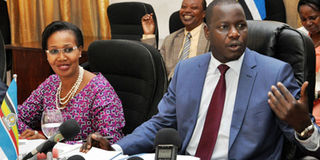EALA to discuss free movement of people in region

EALA Speaker Daniel Kidega (R) conducts the Assembly during the fifth meeting of the third session of the third assembly in Bujumbura yesterday. Left is Ms Hafsa Mossi, Burundi’s representative. Courtesy photo
What you need to know:
Mr Kidega said that their target is to pass at least three bills during this session
KAMPALA. The elimination of Non-Trade Barriers Bill 2015, which seeks to encourage free movement within the region, will be one of the priority topics for discussion at the East Africa Legislative Assembly (EALA) sitting at Bujumbura in Burundi.
The fifth meeting of the third session of the third assembly, which opened yesterday, will go on until March 27.
EALA Speaker Dan Kidega said: “EALA will continue to play a central role in the legislative framework and oversight to ensure the integration agenda remains smooth. Our desire as the Assembly has been to see the Non-Tariff Barriers (NTB) removed to facilitate movement of goods and persons in the region,” Kidega said.
He said NTBs have consistently interfered with the progress of integration.
To achieve this, Mr Kidega said: “The Assembly has and will continue to involve the citizens of the region using various means such as public hearings, workshops and visitations. The involvement of East Africans in the process is fundamental, given the fact that it is very much “a people-centered process”.
Last year, the EAC Common Market Scorecard 2014, developed by the World Bank in coordination with the EAC for over a period of 18-months, measured and tracked progress in compliance with commitments to remove obstacles to free movement of capital, services and goods.
Now towing the line
The report noted that no East African member state had fully lived to the commitment of the common market protocol to ease business but have instead introduced new restriction.
The scorecard notably identifies at least 63 non-conforming measures in the trade of services and 51 non-tariff barriers affecting trade in goods while in the area of capital, only two of the 20 operations covered by the Common Market Protocol are free of restrictions in all of the EAC Partner States.
In October last year while speaking at the launch of the Sixth East African Business Summit in Kigali, Rwandan president Paul Kagame said: “We have unwarranted worries. We have experimented this in Rwanda. When we opened our borders, removed restriction on work permits and visas, everyone benefited. We have benefited”.
Other topics
The assembly will also debate key legislations which include The EAC Customs Management (Amendment) Bill, 2015; the EAC Competition (Amendment) Bill; the EAC Integration (Education) Bill; the EAC Cross-Border Legal Practice Bill, 2014; the Elimination of Non-Tariff Barriers Bill 2015; and The EAC Electronic Transactions Bill, 2014. Mr Kidega said that their target is to pass at least three bills during this session.




